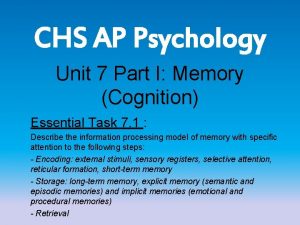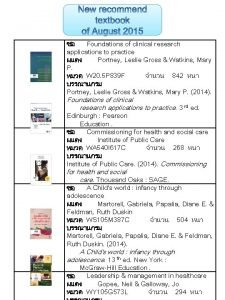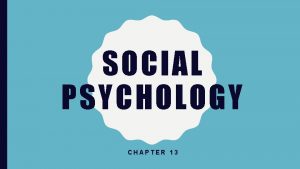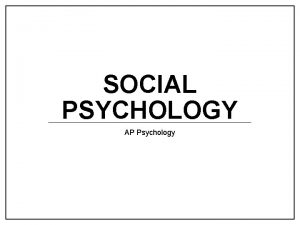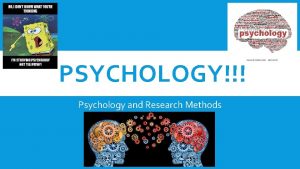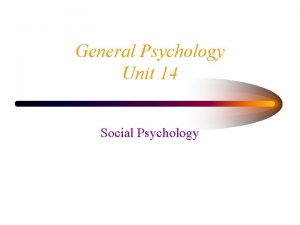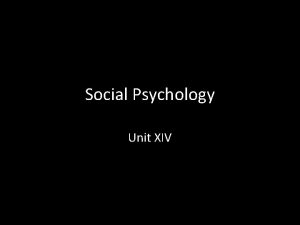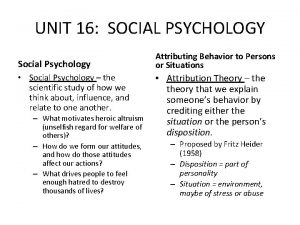Psychology Foundations and Research Unit 1 Part 1















- Slides: 15

Psychology Foundations and Research : Unit 1: Part 1

Define psychology The word literally means “study the soul” From the Latin translation : psukhē, "breath, spirit, soul" and logia, "study of" or "research“ A modern definition is a science that seeks to answer all sorts of questions about us all: how we think, feel, and act.

History Of Psychology The history of psychology can be traced back to ancient Greece where naturalist and philosopher Aristotle theorized about learning, memory, motivation, emotion and perception.

History Of Psychology 1. Wilhelm Wundt- is considered by most to be the father of modern psychology -Germany 1879 -Created an experimental apparatus to calculate the time lapse between a person hearing a ball hit a platform and them pressing a telegraph key. -Measure the atoms of the mind -Started the first psychological institute

History Of Psychology 2. Sigmund Freud Austria 1900 Psychoanalytic theory Published “The interpretation of dreams”

History Of Psychology 3. (Burrhus Frederic) Skinner Box B. F. Skinner -American Created operant conditioning box (Skinner Box) Radical Behaviorism- no free will

History Of Psychology 4. William James United States 1890 Publishes Principles of psychology Pragmatism Functional psychology Radical empiricism

History Of Psychology 5. Carl Rogers-b 1902 United States Client centered-therapy Student centered learning

Psychology’s Perspectives Currently there are six major psychological perspectives that influence the way we question certain topics. Perspectives are NOT in competition with each other and need not contradict. 1. Neuroscience 2. Evolutionary 3. Behavior Genetics 4. Behavioral 5. Cognitive 6. Social-cultural

1. Neuroscience How the body and brain create emotions, memories and sensory experiences Example: Anger Study the brain circuits that trigger the physical states of “being red in the face” or “hot under the collar”

2. Evolutionary How natural selection favors traits that promote the perpetuation of one’s genes. Example: Anger Study how does anger facilitate the survival of genes.

3. Behavior Genetics How much our genes, and our environment, influence our individual differences. Example: Anger How does genetics and experience influence our individual differences in temperament.

4. Behavioral How we learn observable responses. Example: Anger Might study the facial expressions and body gestures that accompany anger, or might attempt to determine which external stimuli result in angry responses or aggressive acts.

5. Cognitive How we process, store, and retrieve information. Example: Anger How our interpretation of a situation affects our anger and how our anger affects our thinking http: //youtu. be/dq 8 NOptnf. Q

6. Social-cultural How behavior and anger vary across situations and cultures Example: Anger Explore which situations produce the most anger and how expressions of anger vary across cultures.
 Ap psychology unit 7 memory
Ap psychology unit 7 memory Foundations of clinical research applications to practice
Foundations of clinical research applications to practice Unit 1 foundations of american government
Unit 1 foundations of american government Foundations of american government unit 1 test review
Foundations of american government unit 1 test review Unit 6 review questions
Unit 6 review questions Module 7 research design and ethics in psychology
Module 7 research design and ethics in psychology Part whole model subtraction
Part whole model subtraction Unit ratio definition
Unit ratio definition Brainpop ratios
Brainpop ratios Part by part technical description example
Part by part technical description example Footed ware
Footed ware The phase of the moon you see depends on ______.
The phase of the moon you see depends on ______. Two way anova minitab 17
Two way anova minitab 17 Positive psychology ap psychology definition
Positive psychology ap psychology definition Ap psychology social trap
Ap psychology social trap Fundamental attribution error ap psychology
Fundamental attribution error ap psychology
